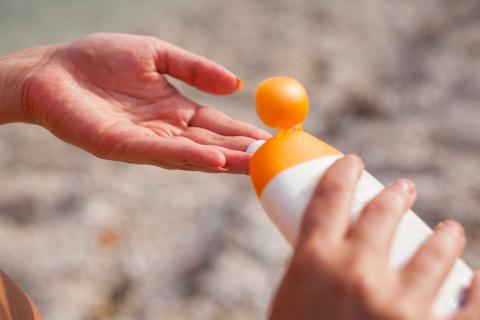
Study Shows Many Sunscreens Contain a Carcinogenic Compound
An organic sunscreen filter frequently used in sunscreens and anti-aging creams, octocrylene degrades within the bottles themselves into a known carcinogenic and endocrine disrupting compound: benzophenone. This is the result of a groundbreaking study conducted by researchers from the Laboratory of Biodiversity and Microbial Biotechnology of the Oceanological Observatory of Banyuls-sur-Mer (Sorbonne University/CNRS) in collaboration with their American colleagues, published in the journal Chemical Research in Toxicology on March 8, 2021.
Industries producing octocrylene know that this molecule is contaminated with benzophenone and that the latter cannot be eliminated in its entirety during octocrylene production. In addition, the concentration of benzophenone in octocrylene-based manufactured products is considered "negligible" by the cosmetics industry. However, octocrylene degrades naturally into benzophenone within the packaging itself. During its study, the Franco-American research team discovered that this substance was present in the 15 commercial products tested. Moreover, the scientists demonstrated that the concentration of benzophenone in these cosmetics increases rapidly as the product ages.
The scientific community and the cosmetic industry commonly agree that both octocrylene and benzophenone are easily absorbed by the skin1. As such, octocrylene no longer meets U.S. FDA2 safety criteria, and accumulated scientific data indicates that it may be a reproductive toxicant, metabolic and endocrine disruptor. In addition, octocrylene is also described as environmentally toxic, affecting corals in swimming areas and potentially decreasing the resilience of coral reefs to climate change3. The fact that octocrylene products are contaminated with benzophenone in significant amounts therefore calls into question the overall safety of these products for public use.
Carcinogen, photomutagen and endocrine disruptor: what we know about benzophenone
In the United States, benzophenone is banned in food products and packaging and is listed as a carcinogen and developmental disruptor under California's Proposition 65. In mammalian model studies, benzophenone exposure induces liver cancer and lymphoma. It may also act as a photomutagen: in the presence of light, the rate of DNA damage increases, thus increasing the risk of skin cancers. Finally, benzophenone is also known to be an endocrine disruptor, affecting thyroid function and inducing anti-androgenic activity, which can retard testicular development and cause anatomical deformities to the female reproductive organs.
To date, octocrylene has already been banned in sunscreen products in some territories such as the U.S. Virgin Islands and the Republic of the Marshall Islands. Cosmetic products containing octocrylene are also banned in the Republic of Palau (Micronesia) since January 1, 2020. President Tommy Remengesau, Jr, who signed the ban, said, "Palau has identified an emerging environmental threat that is uniquely related to tourism: the use of sunscreens in outdoor recreation. Preemptive regulation of these chemicals and other risky contaminants is not only good policy, but also a manifestation of a traditional Pacific paradigm of conservation management. We should demand intensive, independent studies on the safety of all chemicals used in personal care products, and new research like this one further reinforces that imperative. Science must come first; we cannot gamble with the health of the environment.
The findings of this groundbreaking study provide new scientific evidence to argue that octocrylene-based products—and therefore benzophenone-contaminated products—can pose a threat to individual and public health, as well as to the environment. The team concludes: "Our results argue for the implementation of regulations based on the precautionary principle, with the objective of protecting public health and the environment.
1] Dermal absorption of benzophenone into the body can exceed 70%, according to studies conducted by Professor Howard Maibach and colleagues in the 1990s—a strong argument for a regulatory ban on benzophenone and octocrylene in fragrances and other topical products.
2] The Food and Drug Administration
[3] Findings from a previous study conducted by researchers in the Microbial Biodiversity and Biotechnology Laboratory, published on December 5, 2018 in the journal Analytical Chemistry: http://www.sorbonne-universite.fr/actualites/les-coraux-menaces-par-nos-cremes-solaires
Reference:
Time-dependent benzophenone accumulation in commercial sunscreen products from the degradation of octocrylene, Craig A. Downs, Joseph C. DiNardo, Didier Stien, Alice M. S. Rodrigues and Philippe Lebaron, Chemical Research in Toxicology, 8 March 2021.
DOI: https://doi.org/10.1021/acs.chemrestox.0c00461
Contact:
Philippe Lebaron
Professeur de microbiologie et d’écologie marine à Sorbonne Université
Didier Stien
Directeur de recherche au CNRS
Marion Valzy
Service presse de Sorbonne Université
